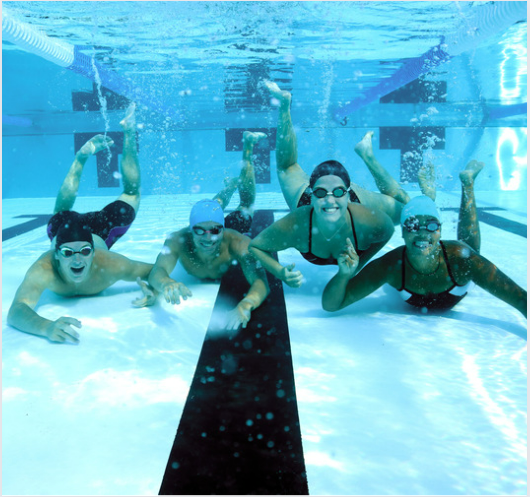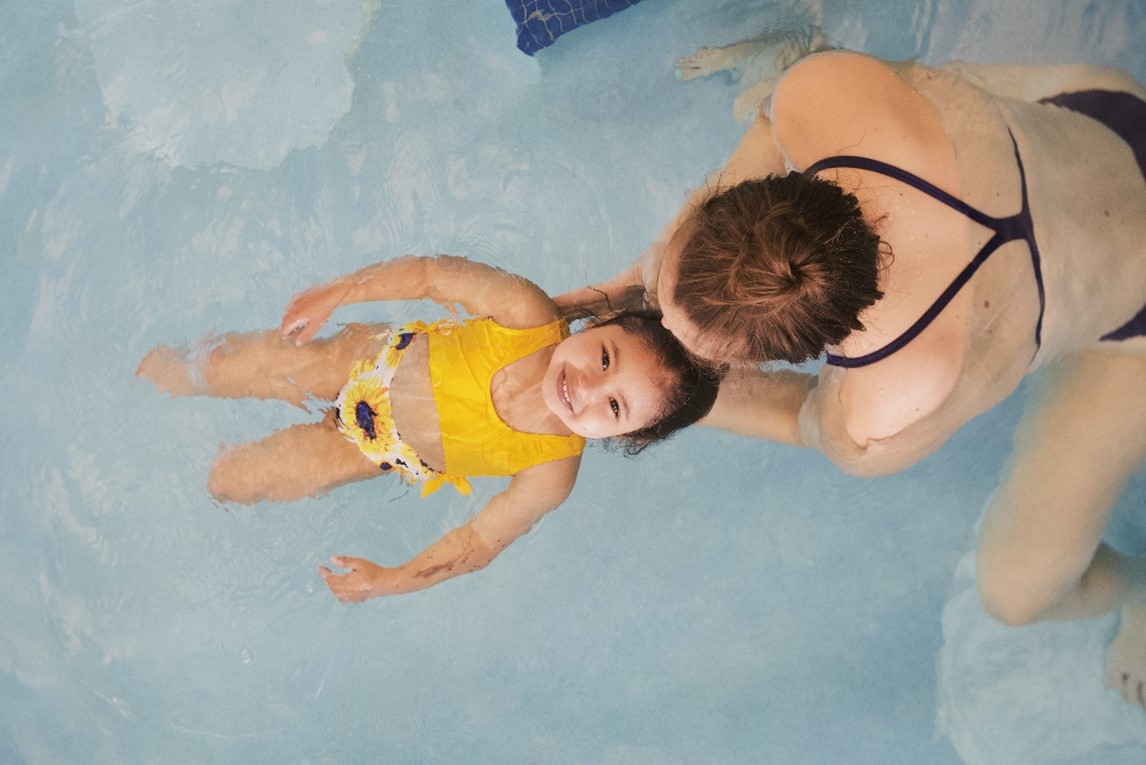Perfect Your Race Day Routine


Perfect Your Race Day Routine
Competitive swimmers put in hours training in and out of the pool, all in preparation for race day. Whether you are aiming to best your own time or you want to win that medal, race days are both exciting and nerve-wracking. You want all of that hard work to pay off. Before you dive off of the blocks, though, take the time to figure out what race day routine works for you. Here are a few tips for crafting the best race day routines for swimmers.
Why Race Day Routines Are Important
Athletes can have superstitious routines they feel help give them an edge in competitions, or maybe they feel they have a lucky piece of swim training equipment. Superstitions probably won't hurt your race performance, but race day routines for swimmers are about more than feeling lucky. Effective routines are based on careful preparation that gets your body and mind ready for intense competition. No matter how much time you have spent training before a race day, you will probably still feel nervous. Even professional athletes experience nerves before a big race. That adrenaline can help fuel your performance, but it can also scatter your focus and negatively affect your abilities. Finding the right routine helps ensure you can properly channel that jittery energy. When you find your routine, you can carefully trace the steps you have taken to prepare yourself physically. This mental evaluation can help calm your nerves, leaving you with both energy and reassurance that you have done everything you can to perform at your peak. The best race day routine for swimmers is about putting in the work to prepare yourself physically, taking care of your body before pushing it to the limit and boosting your confidence.
What to Do Before the Big Swim Meet
The work it takes to put together effective pre-swim-meet routines starts with habits you form before the big day. When you know you are gearing up for a big race, try to incorporate these tips and activities into your schedule:
1. Focus on Your Training
How much work you put into your training is the biggest deciding factor when it comes to your performance on race day. You are not going to gain much improvement in form and time with last-minute cramming. When you know you are working toward a big race, schedule your practice times appropriately. You need to be getting into the pool on a regular basis. Talk to your coach about different drills you can focus on during your training sessions and ask for feedback. Set goals for yourself and revise those goals when you beat them. It might not seem like a big deal to skip a practice session or to put in minimal effort during a workout, but that lack of effort does add up. Find ways to keep yourself motivated between races. All of that effort will be worth it when you step up to the starting blocks on the big day. You can feel confident that all of the training made your body as physically prepared as possible. 
2. Get Enough Sleep
Competitive swimmers have to juggle all of those long training hours with the other responsibilities — school, work, socializing, etc. — in their lives. That often means sleep gets put on the back burner. After all, you need to get up early to get back in the pool. If you want to see an improvement in your time, however, sleep deprivation is not going to help. One study found that 17 to 19 hours of sleep deprivation can translate into reaction times that are 50 percent slower. As any competitive swimmer knows, shaving even milliseconds off of your race time can mean the difference between first and second place. How much is enough sleep? Swimmers put in long hours of hard training. Your body needs to recover from that. The average adult needs seven to nine hours of sleep per night. At the peak of intense training periods, swimmers can need as much as 10 or more hours of sleep per night. If you know you have a big meet coming up, sleeping for 12 hours the night before a big meet — but not getting enough sleep the other nights — won't cause much of a change in your race time. If you want sleep to make a difference, you will need to make it a regular part of your schedule. Commit to extending your sleep schedule during the intense training leading up to a competitive meet.
3. Double Check Your Gear
Always check your swim gear the night before the big meet. Make it a part of your routine to check your goggles, your swimsuit and your swim cap. Is each piece of equipment in top condition? The last thing you want to happen is to have your goggles leak or fog up as soon as you dive into the water for a big race. Even worse, you do not want the strap on your goggles to be loose or worn. Try on your goggles. Check the fit. If possible, test them out in the pool well before the race. Competitive swimmers often set aside different suits for practice days and race days — many swimmers swear by tech suits for race day. If you have not tried on your race day suit in a while, put it on before the race. Check that the suit still fits. Make sure it does not have any small tears, which could create more drag in the water. Check your swim cap for any small tears as well. If possible, have backup gear so you do not find yourself scrambling the night or morning before a race to replace your suit, goggles or swim cap. Shop Swim Gear
4. Eat a Healthy Meal
Eating healthy is good advice for anyone, particularly athletes who have grueling training schedules. All race day routines for swimmers should include a healthy meal. You might feel too nervous to eat before a competition, but aiming to eat a meal about four hours before a race is a helpful way to ensure your body has the energy it needs. Try for foods with complex carbs, like oatmeal or whole grain bread, and avoid those with a lot of sugar. If you find yourself looking for snacks between races, try small portions of fruits, nuts or yogurt. 
Tips for a Successful Race Day
After all of those hours training in the pool and all of the work you put into your sleep and meal schedules, race day finally arrives. Here are a few tips to keep you focused and ready before you take off from the blocks:
1. Arrive Early
After all of the long hours of preparation, feeling rushed the day of the race is the last thing you want. If you are running late, you are more likely to forget something you need. Plus, you will be worrying about being late and feel less focused as a result. Wake up with plenty of time to have a solid meal that will help fuel your performance. Check your gear one last time. Gather everything you need for the day, and head to the pool. Once you are there, you can take your time suiting up and going through the rest of your race day routine.
2. Warm up in the Water and on Land
You have done all of your training ahead of the race, but your body still needs to warm up before the competition. A good warm-up ensures your muscles are ready to perform during the race. Your core temperature rises, and oxygen delivery to your muscles increases. If possible, you'll want to warm up in the pool, but do not push yourself too hard. You just want to prime your muscles, not exhaust them. You don't necessarily need to add anything special to your warm-up. Do what works for you. A study found that 44 percent of swimmers who did a typical pre-race warm-up performed best. The same study found 19 percent of swimmers performed better after a 50-yard warm up done at 40 percent intensity. A little over a third of swimmers (37 percent) did best after no warm-up at all. Keep in mind that the positive effects of your warm-up will only last so long. If there is a big gap between your warm-up and your actual race, you will lose the benefits. If you know there is going to be a long stretch of time between your pool warm-up and your race start, there are a few things you can do on land to stay primed. Keep your core body temperature up by wearing warm clothing while you wait for your start time. While you are dressed, do a dry-land warmup what will mimic your movements in the water. Another study found that swimmers who wore warm clothing and did a dry-land warm-up swam nearly a second faster.
3. Practice Visualization
It might be tempting to distract yourself with thoughts about anything but your big race, but visualizing your race can actually improve your performance. Just ask Michael Phelps. He has often talked about visualization as a big part of his routine. Visualization can be a simple but powerful part of your race-day routine. All you need to do is imagine yourself swimming and achieving your desired goal. When you visualize yourself swimming, focus on a positive outcome. You can also imagine taking any obstacles in stride and overcoming them. By imagining this over and over again, your brain will start to believe you have swum the race many times before you even dive off of the blocks. Remember, visualization is like any other skill. You need to practice. Close your eyes. Add all of the details you can think of for race day. If your mind wanders, that is perfectly normal. Just try again. Practice this before every race, and it will become a positive part of your routine. 
4. Check out the Pool Ahead of Time
Last minute surprises can throw anyone off. Do your best to limit those unexpected events. If possible, check out the pool before the day of your race. How many lanes are there? What do the blocks look like? Where are the spectators' stands? Knowing these details can help you feel as prepared as possible. If you can't see or swim in the pool before the day of the race, arrive early so you can get a feel for the place where you will be competing. You can also try to look up pictures and details online. When you have all of this information, you can reduce some of the inevitable nerves that come with race day. Reassure yourself you have done your research, and you have put in the training hours. You are ready for the race.
5. Avoid Major Changes in Your Swimming Technique
Technique plays a huge role in a swimmer's performance. You might be tempted by a technique you have never tried before. It could give you a competitive edge for the race, right? That seems logical, but last-minute changes to your technique can actually hurt your performance. You have spent hours training and honing your technique to as close to perfection as possible. Your coach has guided you every step of the way. Your muscles are finely tuned to perform that technique smoothly throughout the entire race. If you introduce something new without the benefit of long hours of practice, your muscles might get confused. You could experience unexpected glitches in the middle of the race. If you are intrigued by a new idea, save it for practice.
6. Try to Relax
Anyone who participates in competitive sports knows how much adrenaline gets pumping the day before a big game or race. Trying to relax is easier said than done, but it is good advice. Of course, you take race day seriously. You have dedicated hours of your time and put your body through a lot of hard work. You have goals to meet, and you want to win the race. Even so, you should not lose sight of the bigger picture. You should enjoy yourself on race day. Even if you do not take first place, a race is the culmination of your hard work, so take a deep breath and try to relax. You have a solid pre-race routine, and you will swim your best. If you do not do as well as you wanted, you have time to prepare for the next race.
Get the Right Swimming Gear at Kiefer
Having the right gear is a big part of feeling ready for race day. If you are looking for a new suit or just the right pair of goggles, browse the huge selection at Kiefer. Armed with your swim race routine and your swim gear, you will feel ready to launch off of the blocks and into the water to get your best time yet. 







Leave a Comment
Your email address will not be published. Required fields are marked *